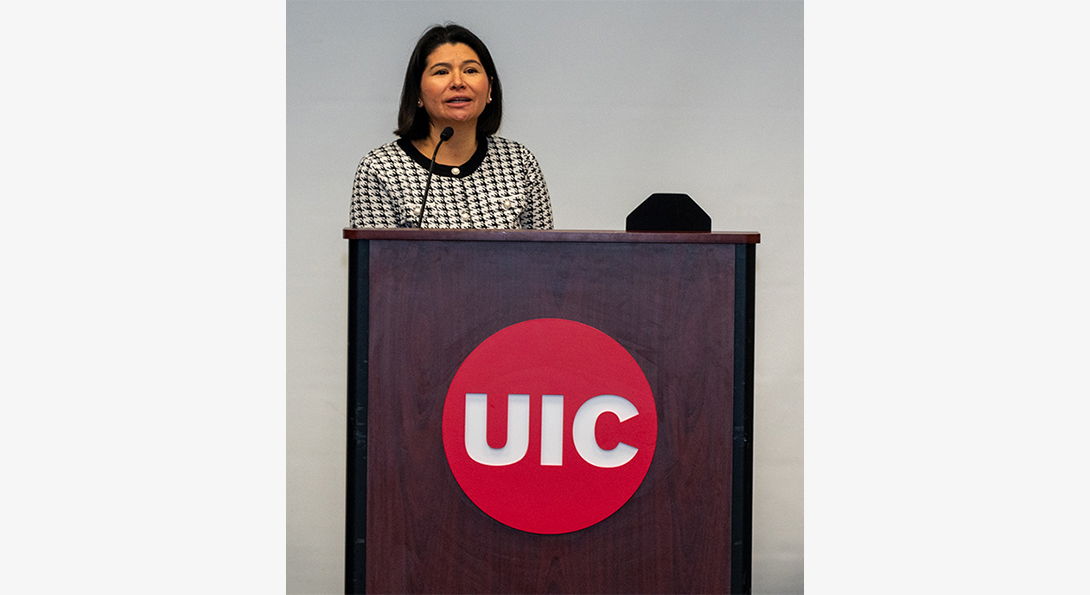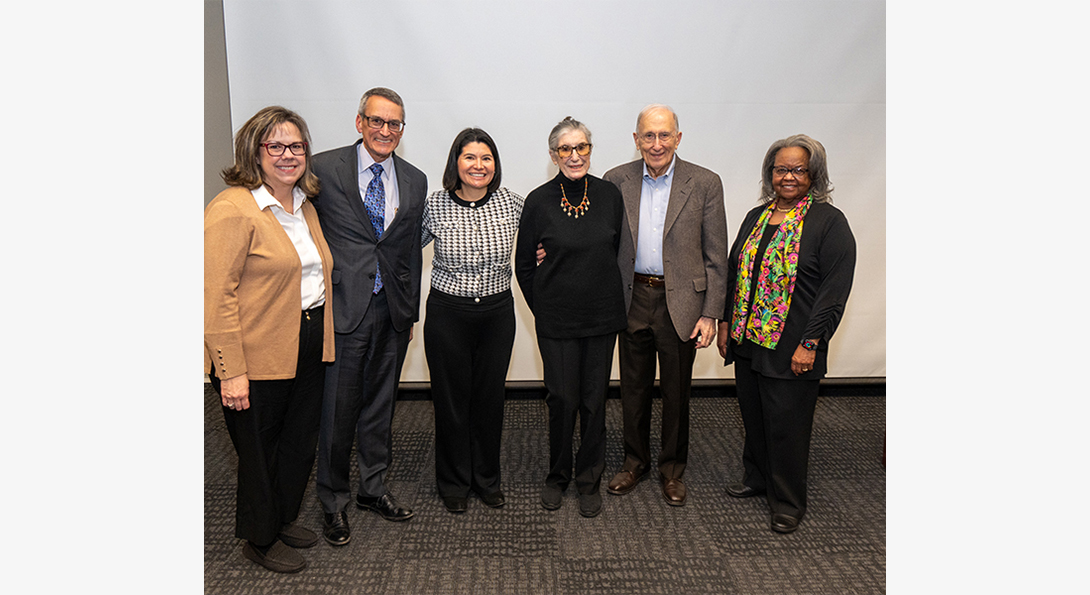Immigration Attorney Alt Delivers Honig Lecture

Gladis Molina Alt sees some of herself in every immigrant child she helps.
An attorney who serves as executive director of the Young Center for Immigrant Children’s Rights, Alt left her home country of El Salvador at the age of 10 to begin a new life in the United States. She served as keynote speaker at the Jane Addams College of Social Work’s 28th Karen J. Honig Memorial Lecture, presenting “Welcoming the Newcomer: Meeting Migration Trauma with Trust, Generosity, and Support.”
A former educator who entered the social work field upon graduating from the Jane Addams College of Social Work in 1986, Karen Honig worked with youth aging out of foster care who were transitioning into independent living. The social workers at the Young Center emulate Honig’s work.
“One of Karen’s favorite quotes was, “Life is not getting or giving, it is a being and becoming” deeply resonates with me,” Alt said. “I invite all of us to reflect on who we are being as a nation in our attitude towards newcomers and who we can become.”
Alt focused on three points during the lecture: The layers of trauma endured by many immigrants; the ineffectiveness (and compounding traumatic effect) of immigration practices and policies spanning the last three decades; and the opportunity (or need) to meet current migration trends with an approach grounded in trust, support, and generosity.
Immigrants often live through many layers of trauma, Alt said. Dangers in their native country – insecurity surrounding personal safety, the lack of protection, ongoing violence, war, political oppression, or conditions limiting basic human rights – often consume individuals’ survival. A constant struggle for everyday necessities - food, shelter, water, and access to education and health care - are also perceived.
“If we pause to simply consider the impact of these circumstances in people’s lives, we can imagine the sense of fear, anxiety, hopelessness, and desperation that people must experience,” Alt said. “The emotional and psychological impact, not to mention the physical impact, takes a toll on people.
“Any of us would be thinking about that and looking for a way out fast.”
A sense of loss is felt by many immigrants when leaving their homeland. Children who are left behind often experience abandonment and isolation issues. Without parents’ care and protection, children are harmed in other ways, Alt said.
“As a little girl, I stayed behind in El Salvador when my father left before I turned two and when my mother left to join my father a month before I turned five,” she said. “As a mature adult and mother now, I am still unpacking the full impact of our family’s separation because of the devastating civil war in El Salvador. The journey to a new destination leaves deep wounds and scars – both physical and psychological – for many migrants.”
Just reaching the U.S. border is not a cause for celebration. Immigrants experience trauma as they face the stress and dangers of coping with a militarized border, barriers that can (or are meant to) cause them physical injuries, criminal prosecutions, prisons, detention centers, legal immigration proceedings without an attorney, and family separation, Alt said.
Honig story continues Heading link

Failed policies add to trauma
Policies proposed, approved, or implemented over the past three decades have increased immigrants’ trauma and vulnerabilities, causing dehumanization and lessening their potential to become contributing members to society, Alt said.
“Boldly and unequivocally, I say these government policies and practices, both at the state and federal level, have not worked,” she said. “These measures are out of touch with the reality that humans will migrate to seek safety, survival, and move from scarcity to plenty. And the mindset behind these policies ignores our country’s need for additional human resources.”
As a first-year student in a California high school in 1994, Alt was one of a record number of foreign-born children enrolled in the state’s public school system. In response to the overflow of immigrant children, the state passed Proposition 187 that same year, a law that prevented undocumented children from accessing public education and other services. Alt was devastated, thinking she would not be allowed to attend school anymore.
“What would become of my life?” she said. “With no immigration status, I did not have many options. I got the message that it was wrong (and might soon be completely illegal) for me to be in the public education system, and that I was not welcome in the U.S.”
Alt did graduate from high school, as well as California State University Long Beach. She then received her law degree from the University of California, Los Angeles (UCLA), before beginning her career as an immigration attorney. The task of pursuing justice for immigrants in the coming years seems daunting, but with hard work there are ways to support newcomers in communities.
Trusting immigrants is paramount in propelling the nation forward, Alt said. Immigrants should not be seen as problems, but as an opportunity to simultaneously provide safety for those in need of protection, and for the U.S. to incorporate diverse ideas and secure an able workforce into the future. What would trust look like? Alt asked.
“First, our government would adopt policies with a mindset that detention and undue surveillance of newcomers is unnecessary,” she said. “The starting point for our border policies would not reflect the response of an invasion. Our response would be human centered, as opposed to immigrants being punished.”
Alt also suggested that by initiating policies allowing newcomers access and integration into the U.S. educational and workforce systems while preserving and strengthening opportunities for American citizens is important. There can be enough for everyone, whether born in the U.S. or in a foreign land. Policies reflecting a belief that investing in immigrants will unleash and develop their potential is her third suggestion.
“These are just some examples of trust-based approaches that would change the course of our current national dialogue,” Alt said. “The arrival of new immigrants can strengthen our nation. It does not weaken, dilute, or poison us. In the past, we’ve relied on immigrants to build our nation, and that will remain true in the years ahead. We don’t get to say that we are a nation of immigrants only when immigrants look, think, or behave like us.”